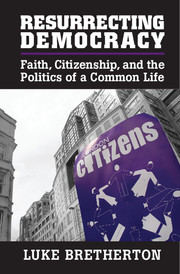8 - Economy, Debt, and Citizenship
Published online by Cambridge University Press: 18 December 2014
Summary
Previous chapters have displayed how broad-based community organizing (BBCO) does not operate with a contractual or rights-based vision of citizenship. Rather, it was shown to be consociational in form and rationality and populist in its performance of democratic citizenship. This chapter builds on the analysis and description given so far in order to contrast the gift-based forms and patterns of relationships that shape BBCO with those that undergird contractual, rights-based conceptions of citizenship. Modern political thought has tended to valorize contractual conceptions rather than the gift-based or covenantal visions of citizenship of the kind that underwrite BBCO. Yet, in the contemporary context, in relation to the vexing question of whether democratic citizenship can challenge the power of money in shaping our common life, it is gift-based visions of citizenship that need to be at the fore of the debate. To understand why and draw out how liberal conceptions of social contract and rights are inadequate as the sole basis for conceptualizing democratic citizenship, we must examine the relationship between debt and citizenship and why forms of gift and mutuality are vital means of challenging the prioritizing of profit over social relationships. In examining the linkages between debt and notions of citizenship, we discover that the problems of usury and debt slavery – the problems we began with in this study – turn out to be ones that are paradigmatic for democratic citizenship, and ones that democracy, from its very origins, was a means to address.
- Type
- Chapter
- Information
- Resurrecting DemocracyFaith, Citizenship, and the Politics of a Common Life, pp. 243 - 284Publisher: Cambridge University PressPrint publication year: 2014

